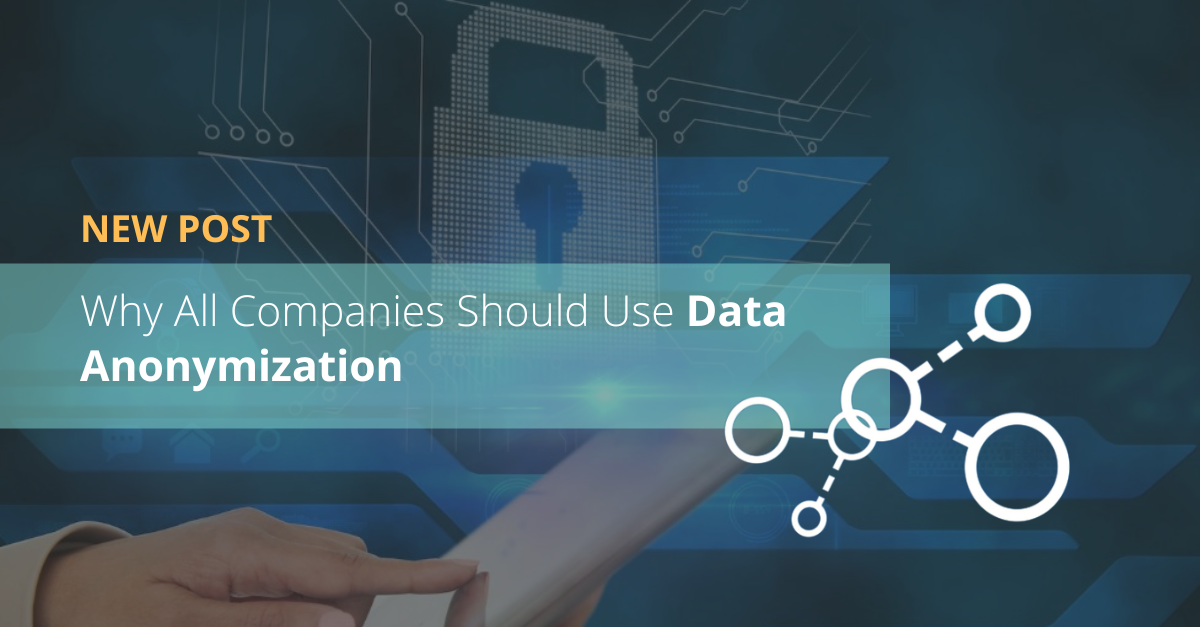Nowadays, personal data protection is a strategic action for companies. And not only for compliance with legal regulations, but also to avoid loss of trust and, consequently, loss of business opportunities.
One of the key techniques for protecting this data is anonymization. By using this technique, the anonymized data cannot serve as an identifier for the data subject. However, this also means that the data becomes more aggregated and sometimes less useful.
So, why should all companies use data anonymization? When is anonymization essential?
What is a data anonymization?
A data anonymizer is the technological tool that removes information that serves to identify a person, in order to generate anonymous data that can be disclosed and used without requiring any authorization or consent.
But the elimination process is not only focused on direct identifiers. Anonymization has the ability to detect and remove secondary data that may help establish some connection to the holder.
This is because anonymization employs natural language processing (NLP) tools for the detection and removal of terms that may constitute personal information or may serve as clues for identifying an individual.
Recommended reading: 6 Personal Data Anonymization Techniques You Should Know About
Why is it essential to use data anonymization for personal data?
When data is anonymized, identifiers that can link it to data subjects are removed or coded. This anonymization process is essential to any company for the following reasons:
- It helps comply with the GDPR. By using data anonymization, companies can delete essential data that it does not use, or delete it after it has completed its service provision. For example:
- The elimination of personal data in commercial documents.
- It provides the possibility to publish information without jeopardizing its confidentiality. This will be extremely useful to, for example, the following groups:
- Law firms sharing court rulings.
- Healthcare entities when analyzing personal medical data for statistical analysis.
- Any public administration when sharing information.
- It provides security against the risks of cyberattacks. If a company uses data anonymization and information is stolen, it will be worthless to the hacker, who will not be able to misuse it.
- It helps to increase trust in the company. Customers will perceive the security with which their personal and sensitive data is treated.
- It enables the use of accurate data and the performance of advanced data analysis, while always maintaining privacy in big data.
GDPR
The General Data Protection Regulation (GDPR) stipulates that those responsible for processing personal data must put in place measures to ensure a certain level of security and thus preserve individuals' privacy.
To comply with this, the GDPR requires the deletion of identifying data that can establish a connection with the holder. And this is where anonymization comes into play.
It is a mandatory procedure for companies and organizations that collect and store personal data in the fulfillment of their business purposes, and are established in the European Union, have a business relationship with Europe or make use of information belonging to European individuals.
Other regulations for personal data regulations
Apart from the GDPR, in Spain private data protection is also regulated by the Organic Law on Protection of Personal Data and Guarantee of Digital Rights (Ley Orgánica de Protección de Datos Personales y Garantías de los Derechos Digitales, or LOPDGDD). This law adapts Spanish regulations to the European Union Regulation 2016/679.
The LOPDGDD establishes the deliberate reversal of anonymized data to re-identify its subjects as a very serious infringement. This highlights the importance for companies to have an effective and reliable anonymization process.
In other places, such as in the United States, there are other regulations, including the Health Insurance Portability and Accountability Act (HIPAA) and the California Consumer Privacy Act (CCPA).
Related content: Compliance with Pseudonymization According to GDPR
Discover the best data anonymizers
At Pangeanic, we develop complex data anonymization services through artificial intelligence, making it easier for companies to comply with Europe's GDPR, with the USA's HIPAA and CCPA, or Japan's APPI.
In addition, we are leading one of the European anonymization projects through the development of MAPA. This project provides public administrations with an effective and completely reliable data anonymization tools, especially in the legal and health sectors.
MAPA uses natural language processing (NLP) tools, such as techniques for the classification and recognition of names, addresses and all kinds of confidential information, thanks to the use of neural networks and deep learning.
With this effective anonymizer, public administrations will be able to share information and, at the same time, fulfill their obligation to protect every citizen's personal and private data.
Anonymization is definitely becoming not only a requirement by law for the running of a company that processes personal and sensitive data, but also as a tool that can provide numerous advantages.
Do you need to share anonymous data? Do you want a higher level of information security? Contact us. At Pangeanic, we will advise you on the method of anonymization or pseudonymization that best suits your company.




